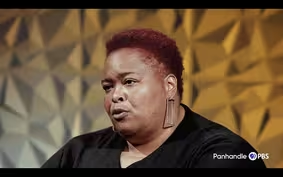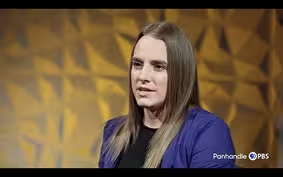Living While Black
How do we move forward?
Clip: 4/15/2021 | 9m 31sVideo has Closed Captions
Amarillo residents discuss the best courses of action to take in order to make change.
Amarillo residents discuss the best courses of action to take in order to make change.
Problems playing video? | Closed Captioning Feedback
Problems playing video? | Closed Captioning Feedback
Living While Black is a local public television program presented by Panhandle PBS
Living While Black
How do we move forward?
Clip: 4/15/2021 | 9m 31sVideo has Closed Captions
Amarillo residents discuss the best courses of action to take in order to make change.
Problems playing video? | Closed Captioning Feedback
How to Watch Living While Black
Living While Black is available to stream on pbs.org and the free PBS App, available on iPhone, Apple TV, Android TV, Android smartphones, Amazon Fire TV, Amazon Fire Tablet, Roku, Samsung Smart TV, and Vizio.
Providing Support for PBS.org
Learn Moreabout PBS online sponsorship(soft music) - I think that when, anytime that you want change you have to realize that everybody has to be involved in the change.
It can't be just from one race.
It has to be everybody.
And so you want everybody out there rallying for the same thing.
- If we look back at the Civil Rights Movement, we saw that Dr. King didn't walk down the street or cross the Pettus Bridge alone with all African-Americans.
There were Jewish people.
There were Hispanic people.
There were Anglo people.
To abide in the same mindset is one of the most powerful things that we can do as a nation.
And if we could franchise that idea in this movement, I think that we would make strides in areas like social justice and discrimination.
- [Karen] So what happened that you decided to start Solidarity Isn't Silent.
- It was the murder of George Floyd.
We were angry.
I had a lot of anger and I really wanted to channel that in a positive way.
So I asked a few people to just kind of meet me at my house and discuss what we could do.
And our first thought was we could just organize a march here in Amarillo.
And once we started talking about that, we decided that we kind of wanted to go more towards longevity and do something that we could continue doing work instead of just a one-time march.
- [Karen] What happens after the protests?
- I know for a lot of people, nothing.
For me, it was okay, we did a protest.
what's next?
Most of the people went there with good intentions in their heart.
We're out here, we're gonna make some change today.
I think lot of them fail to realize that change does not happen over one protest.
That was not going to change and reverse 400 years of mistreatment.
That was the beginning of a conversation.
And that was all it was.
- Individuals are either gonna avoid the conversation, or they gonna embrace it.
They're gonna listen.
We're sitting here today, based off of that open dialogue, where you're saying, Hey, I'm gonna listen.
I'm gonna take the time.
I'm gonna listen to each one's experience, because they do have an experience.
They do have something to say, and I haven't experienced it, and I don't know, so let's shed light on it.
And so that open dialogue is the action.
- When you're sitting down, you know, you can't just sit down and have a conversation, but you know, you need a plan.
You need to be able to strategize.
You need to be able to negotiate.
You need to be able to say, how are we gonna come together and unite and accomplish the things that need to be accomplished or try to straighten out some of the issues that are problems.
You know, how do we fix those?
- [Karen] What is one thing that white people and other races can do every day that would change this conversation?
- Start doing your own research, and start being more open-minded and more -- like, it's hard to ask anyone to be more accepting, but like the more knowledge somebody has, I believe the more they're going to be able to unravel these feelings that might be, you know, generations and generations deep.
- We can't stay in the same comfortable setting and make change.
We have to get out of that and be uncomfortable for a little bit.
And it should make you uncomfortable.
It should not be an easy conversation to have, because it was not an easy thing for us to experience.
- It only takes one person to kind of break that cycle of thinking.
Push yourself to do the work and unravel any of that anti-Blackness that you have in your heart.
So that's kind of like getting rid of these stereotypes that we have, understanding how you yourself have been racist or have contributed to this, and understanding how you can turn around and contribute to the conversation or educate somebody else.
And I think it's very important that other races sometimes do the educating or do some of the labor, because it shouldn't be up to, you know, every Black person alone to start these conversations, to keep them going or to hand you every bit of information you need.
And so it's important to start that change within yourself and start that change within your own communities and within your own friends.
- If it doesn't make you uncomfortable then you're not listening.
It has been time to have had a conversation.
It is past due time to have a conversation, which is why we've stopped talking and we've started doing so many protests.
- [Karen] How have you watched the protests and the unrest that's going on across the country now?
- I watched that with a lot of sympathy, sympathy because I understand the point they are trying to make, but I feel that they are trying to make -- the point is good, but the way they are going about it is the wrong way.
All of the negativity toward the races was built into the system.
And you cannot change a system by removing statues, burning people's businesses or marching in the street.
You have to go to the source.
How did this happen?
How did that happen?
What law was passed to put this into play?
You know, they sit down and they figured out how to oppress a people.
Sit down and figure out how to undo what was done centuries ago.
- I think first we have to look at how, housing in African-American communities, those policies, putting in place more fair housing, banking, education of our African-American students, the judicial system, every part of it needs to be looked at and revamped.
Some parts just taken apart and reevaluated when it comes to African-Americans.
- When you see something, say something.
People that are especially in positions of power need to be cognizant of what they can do in their environment and their workplace for change.
- [Karen] What should white people do on a daily basis to make change?
- I think that they should be conscious of their decisions and how they might make someone else feel.
You know, it's difficult if you have a prejudice against someone to not clutch your purse or worry that they're gonna do something to you in the elevator.
But to be open to new friendships and conversations, I think would help a lot.
And then there are those that are going a step further and speaking out and, hey, that's always a good thing.
People that are being oppressed always want to speak up about it and say, "Hey, this isn't right."
But when others that it's not happening to them finally say "Hey, this isn't right," then you know that things are changing a little bit.
- We're in a season of change and it's unlike any other time in the history of the world.
To a point where, if we do something differently now, it can last generationally.
- Get with someone who doesn't look like you, and just have a cup of coffee with them, exchange your experiences, but at the same time exchange your hope and your vision, because we all have hope and we all have vision.
And if it's nothing else, it is one thing that we all have in common, that is for things to get better.
So let's talk about how do we make it better?
How can I help you?
How can you help me?
If we fall short of gaining that understanding of where people have been and where they are, our future is gonna look the same as he does today.
- I think the fact that people are coming together, I think that's really good, but I do believe that that's just the first step.
You know, if we don't advocate for change of policies and procedures and laws that are allowing these things to happen, then we're nothing more than a group of people walking from one location to another yelling about how we feel.
It's that next step that you take, you know.
Okay, so the march, you have the march that's the springboard into the action.
(gentle music)
Video has Closed Captions
Clip: 4/15/2021 | 3m 15s | Black Amariloans discuss the importance of voting. (3m 15s)
What does it mean to be anti-racist?
Video has Closed Captions
Clip: 4/15/2021 | 3m 11s | What is the difference in being non-racist and anti-racist? Dr. Derald Wing Sue explains. (3m 11s)
Video has Closed Captions
Clip: 4/15/2021 | 6m 16s | A look at some of the common responses from white people in conversations about race. (6m 16s)
Providing Support for PBS.org
Learn Moreabout PBS online sponsorshipSupport for PBS provided by:
Living While Black is a local public television program presented by Panhandle PBS


















